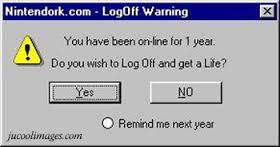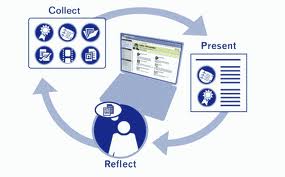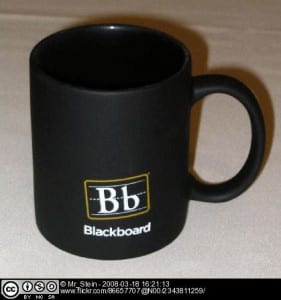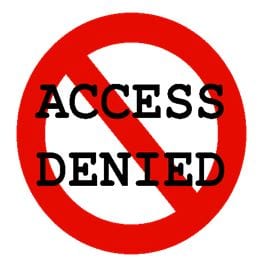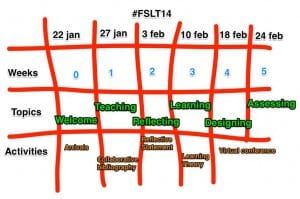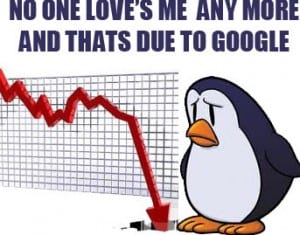A bad back has been useful. I wouldn’t recommend it but enforced rest has been an opportunity for a phd catch up. I can see how doctoral pauses are beneficial. Without realising it’s happening, your brain continues the research process, which includes reflection as much as reading, noting and data collection. Reflection itself is a bit mystical. Like meditation, you know it works but are not entirely sure how. Since my last burst of phd activity, there have been three areas of work which – with hindsight – I can see have been subconsciously influencing my progress.
TELEDA is reaching the end. The taught period is over and colleagues are compiling their eportfolios for submission in three weeks. This is the time for me revisit the discussion forums and activity wiki. Not only as course evaluation, but as reflection-on-action which is integral to my action research methodology. The second TELEDA module has been approved. This will cover social media for teaching and learning, e-resources and synchronous communication technologies, so as well as concluding TELEDA1, I’m gathering content and revisiting learning design for TELEDA2.
All of which connects nicely with my MOOCing. I’ve been dabbling with Oxford Brookes First Steps in Teaching and Learning FSLT14 and Teaching Online Open Course TOOC14. These have been invaluable for repositioning me as a virtual student with all it entails; getting lost in Moodle, misunderstanding instructions, tackling my own digital shyness and virtual discussions with staff who support teaching and learning online.
The third area is the ongoing VLE Implementation Project. I find myself in a situation familiar from discussions with colleagues in other institutions but new to me – of being project managed. I’m not entirely sure what this involves other than a different way of working and additional staff but all departments other than my own. It seems to be about containers rather than content. A bit like the search for a perfect eportfolio which focuses on function over pedagogy. But it’s ok. I know everything will be fine. We’ve been here before, have always survived and will do so again. The synchronicity is relevant and useful. I’m writing a paper revisiting the early rhetorical promise of elearning and how it failed. Because I’m…er… um… older, I remember Dearing and early VLE embedding. Having a formal implementation project is reminiscent of those days when techies talked to techies and staff were told here it is, get on with it. I think, looking back, VLE have always been the technologist’s dreams and the stuff of teacher nightmares.
All this is helping my phd to settle down. Themes are repeating which suggests I’ve found my research area. The pilot interviews have helped too. They’ve reinforced how an information repository model dominates vle use. This view is supported by the Blackboard stats. My research is investigating the influence of teacher education on the shift from campus to online delivery, from inaction to interaction on Blackboard. Upgrading, adding Mobile, Collaborate, Connect and other bells and whistles is fabulous for me. I love the affordances of synchronous communication over traditional barriers of time and distance. I enjoy the challenge of teaching online. What’s missing are the bridges between the technology and the teachers. As Donald Ely wrote in 1995 about the challenges of education for 21st century; technology is the answer – but what was the question?
The answers lie not in the technology itself but in the people who decide about the purpose of its use, the way in which it is used and the manner in which we evaluate the consequences of our decisions. (p16 author emphasis)
Determinism has frequently been the primary driver of technology enhanced learning across the sector. TELEDA and the new Educational Development and Enhancement Unit (EDEU) at Lincoln are opportunities to prioritise the user experience instead. We need to move from inaction to interaction and prioritise e-teaching as much as e-learning.
—————————————————————————————————————————–
phoenix image from http://murraycreek.net/return/book2/wilderpt2.htm





